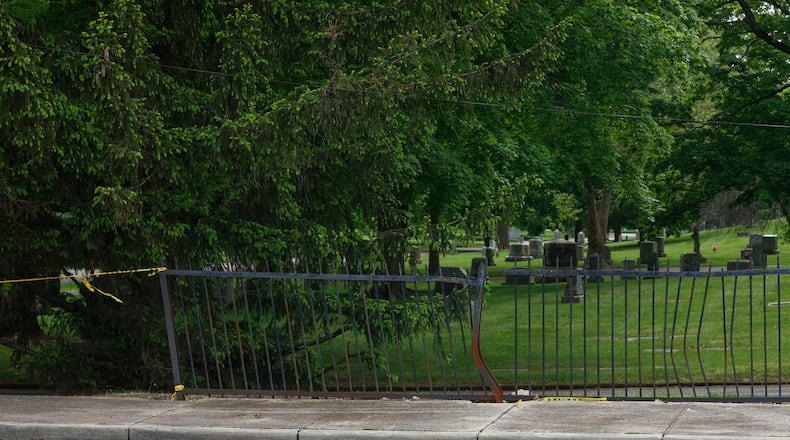The black wrought iron fence is most often hit just past the McCreight Avenue curve, Ferncliff Executive Director Shelley Baker said. She has been working with the city on potential solutions to the problem, seeing a lot of cooperation and attention within the last year-and-a-half, Baker said.
“I feel really good about our partnership with them on this project,” Baker said. “They’ve heard our cries and they’re wanting to help too.”
The frequent crashes — 65 of them since 2018 — have made the fence a Springfield pop culture figure.
Ferncliff created an official Facebook page for the fence, where it shares updates, safety reminders and the occasional sad “0 days since last accident” signs. A parody Facebook page was also created from the point of view of the Ferncliff Fence. The fence goes on adventures across Springfield and pokes fun at drivers.
In October 2023, Champion City Guide & Supply sold merchandise featuring a vintage horror film style woman screaming “Again?” as the fence in the back is crumpled underneath the words “The Curse of Ferncliff Fence.”
Credit: Chris Schutte
Credit: Chris Schutte
Road project details
ODOT would pay up to $200,000 of the estimated $530,382 project, with the city planning to seek additional funds elsewhere to cover all or most of the $330,000 remaining, Moore said. Specifically, the city will look at funding for high traffic volume roads. He said estimates range from 10,000 to 14,000 cars traveling on the road per day.
The agreement details potential work to be done, including a “shave and pave,” base repair, high friction surface treatment and pavement markings.
Moore said these are all under consideration and “very likely” to be part of the project. He said a base repair would find areas where the pavement is weakened to be built back up, which would then be followed by a shave and pave with additional asphalt. Markings would then be replaced.
“The high friction surface treatment is something that we were exploring and think would be useful on this curve,” Moore said. “It is similar to something that we used out by the Masonic Home as you’re coming into town. As you approach Upper Valley Pike, you can see a clear change in the color of the pavement, and because you’re going down the hill at that location toward the stoplight, they want to make sure people don’t slide.”
The surface treatment would be a very thin layer that creates friction, making it harder for a car to slide.
A post and cable system like those on highways was discussed for the road, but Baker said those are not designed to catch cars coming at a 45- to 90-degree angle like those that hit Ferncliff’s fence. She said rumble strips have also been suggested to alert drivers they are veering off the road.
The cemetery plans to replace the fencing in the area that is often hit and move it back seven to 12 feet, potentially past a grassy dip. Staff have gone out by the fence to place markers and measure to visualize how to move it back, Baker said.
“Whenever we’re out there looking at it, we’re always real cautious to watch out in case a car does come around the curve too fast,” Baker said.
She said she has not heard of any pedestrians being hit or any major injuries as a result of the crashes.
The city installed a solar-powered sign ahead of the curve in 2024 to warn drivers to slow down ahead of the curve. Baker said she believes the fence has been hit past the curve at least twice since then, both on the same day.
Baker estimated the fence is hit eight to 10 times a year, a total of 65 times since 2018. The cemetery relies on Spradlin Bros. Welding Co. for fence repairs and it budgets around $30,000 annually in anticipation of crashes.
It’s hard to discern the exact cause for the frequent crashes, and Moore said people with whom he has talked after they analyzed crash data “did not find a consistent theme.”
“And in many cases you don’t know there’s a consistent theme because people don’t admit typically that, ‘I was on the phone or I was eating a hamburger and didn’t pay attention to the curve,’ ” Moore said. “I’m pushing three decades in this business and if I could understand and fix driver behavior, we will be in a much, much better place.”
About the Author





